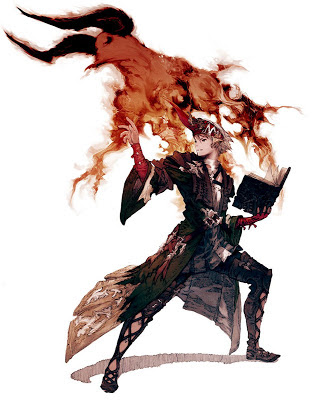I lurve monster-conjuring, but Sword and Wizardry’s Conjure Monster spells just don’t do it for me, and LotFP’s Summon has too many Radiant Frond Phallus Crabs. I wanted a class that was thematically similar to Final Fantasy style summoning, but also something that matched the King Solomon style bossing-genies-around. Rotten Pulp has an excellent take on this, but I was looking for something a little different. Here it is.
SUMMONER, a class for LotFP and retroclones
HP as Cleric, Saves and Equipment restrictions as Magic-User, XP as Elf
 |
| from final fantasy XIV |
Summoners call forth spirits. When they do so, the spirit appears before them and obeys all of their spoken commands to the letter. In order to call forth a spirit, a Summoner must make a pact with it.
There are 5 Order of spirits. A spirit’s Order determines how powerful it is and what kinds of spells it can cast. A Summoner can only make a pact with one spirit from each Order. This requires no more than the Summoner requesting a pact and the spirit accepting, though spirits are rarely accomodating. A Summoner can induce a spirit to accept a pact through bargaining, trickery, or violence.
Summoning or dismissing a spirit takes a number of rounds equal to half the spirit’s HD. If a spirit is reduced to 0 HP, its Summoner takes d6 damage for every HD the spirit had and cannot summon that spirit again for a full day. Spirits recover 1 HP a day no matter what, and cannot be magically healed.
SPIRIT ORDERS
Note: All spirits can cast at least 1 spell per day, and no spirit can cast more than 5 spells per day. Spirits learn spells by eating them, and can cast any spell they know; they do not need to memorize them beforehand like a traditional Magic-User
1st Order Spirit: can cast a number of first level spells per day equal to the Summoner’s level. Has 2 HD, 10 AC, and deals d4 damage on a hit.
2nd Order Spirit: can cast a number of second level spells per day equal to half the Summoner’s level. Has 4 HD, 12 AC, and deals d6 damage on a hit.
3rd Order Spirit: can cast a number of third level spells per day equal to one third the Summoner’s level. Has 6 HD, 14 AC, and deals d8 damage on a hit.
4th Order Spirit: can cast a number of fourth level spells per day equal to one fourth the Summoner’s level. Has 8 HD, 16 AC, and deals d10 damage on a hit.
5th Order Spirit: can cast a number of fifth level spells per day equal to one fifth the Summoner’s level. Has 10 HD, 18 AC, and deals d12 damage on a hit.
So ideally this class will be as much about phrasing commands intelligently and managing Spirits in multiple location as it is about having the right spell. I think I might set up a random tables for for when players send spirits out on a mission unsupervised.
OLD BAD WORSE VERSION FOLLOWS:
Summoners call up Spirits. In order to do so, they must first enter a pact with it. Spirits in a pact will fight and cast spells at their Summoner’s command.
Each Spirit is associated with a Spell Level; they can only cast spells of that level–no higher and no lower. Spirits can cast any spell of the appropriate level known to them. They learn spells by eating them (in written form).
Spirits must agree to enter a pact. Summoners may induce a spirit to do so, through bargaining, trickery, or force. A Summoner cannot have a pact with two or more spirits with the same Spell Level. However, they can enter a pact with a Spirit more powerful than them. If a Summoner can track down and bind a Spirit, it is theirs to command.
When a Summoner calls up a Spirit, it appears before them and asks for orders. It will follow orders to the letter, and continue to follow a command until its conditions are met or told to do something else. Spirits only follow orders directly vocalized by their Summoner. It takes a number rounds equal to a Spirit’s Spell Level to summon or dismiss it, and giving a Spirit a new command takes up a Summoner’s entire turn. If a Spirit dies, the Summoner takes d6 damage for every HD the Spirit had, and the Spirit cannot be summoned again until the following day. Otherwise, spirits can be called forth as often as the Summoner wishes. Spirits regain 1 HP per day, and cannot be magically healed.
|
Spell Level
|
HD
|
AC
|
Damage
|
Spell Slot Progression
|
|
I
|
2
|
10
|
d4
|
1/Summoner level
|
|
II
|
4
|
12
|
d6
|
1/even level
|
|
III
|
6
|
14
|
d8
|
1/level divisible by 3
|
|
IV
|
8
|
16
|
d10
|
1/level divisible by 4
|
|
V
|
10
|
18
|
d12
|
1/level divisible by 5
|
*Spirits start with 1 random spell of their Spell Level, regardless of Summoner level. The maximum number of spell slots a Spirit can have is 5.
A Summoner begins play with a pact with a Level I Spirit who knows 1 random 1st level spell.
EXAMPLE SPIRITS
LEVEL I
Homunculus: Child-sized figure made of darkness; possesses a toothy grin. Summoner can see through its eyes and speak through its mouth.
LEVEL II
Phantom: Can possess the remains of the fallen to gain +1 HP per HD the creature had in life.
LEVEL III
Lamia: Upper body of a human, lower body of a great serpent. Mundane snakes follow her commands.
LEVEL IV
Ifrit: Can throw balls of fire that deal d10 damage on a hit.
LEVEL V
Seraph: Can learn Level V Cleric spells, as well.










